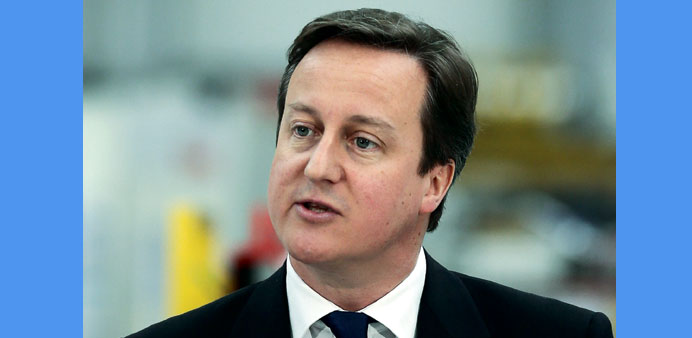The Bank of England kept the benchmark interest rate at a record low for the 73rd month at their last meeting before the May 7 general election. It makes David Cameron the first British prime minister since Clement Attlee in 1950 to serve a full term with no change in borrowing costs.
Bloomberg/London
David Cameron has achieved a new postwar record.
Bank of England officials kept the benchmark interest rate at a record low for the 73rd month at their last meeting before the May 7 general election. It makes the Conservative leader the first British prime minister since Labour’s Clement Attlee in 1950 to serve a full term with no change in borrowing costs.
While Attlee’s tenure saw Britain recovering from the ravages of World War II, this time the UK is healing from the financial crisis. And with the election set to produce no outright winner and inflation at zero, BoE governor Mark Carney’s Monetary Policy Committee has little reason to change stance for now.
“The MPC will be wary that a period of uncertainty following the election will weigh on the economy,” said Vicky Redwood, an economist at Capital Economics Ltd in London and a former BoE official. “They wouldn’t have wanted to move rates in any case. They want to be sure that low inflation doesn’t get ingrained.”
Redwood said she now sees the BoE raising rates in the second quarter of 2016 rather than the fourth quarter this year. The benchmark will reach 1% at the end of next year, down from a previous forecast of 1.25%, she said.
The decision to keep it at 0.5% yesterday was predicted by all 44 economists in a Bloomberg survey. Minutes of the meeting, showing how officials voted, will be published April 22. The key rate was cut to its current level in March 2009, more than a year before Cameron became prime minister in May 2010.
Opinion polls show the Conservatives and the opposition Labour Party running neck-and-neck. With neither set to secure a majority in Parliament, the post-election period could be fraught with uncertainty with politicians wrangling over the formation of a coalition. Britain could even end up with its first minority government since the 1970s, dependent on smaller parties to get any legislation through Parliament.
Both main parties have given investors pause for thought. The Tories have promised a referendum on whether Britain should leave the European Union, something former Prime Minister Tony Blair said Tuesday will lead to “chaos.” Labour Party leader Ed Miliband has pledged not to hold a referendum as he seeks to win support among executives dismayed by his proposals to tax bonuses and cap energy prices.
Economists forecast that the BoE will keep its key rate unchanged until the first quarter of 2016. Investors are ruling out any increase before the second half of that year, Sonia forward contracts show.
The pound stayed lower against the dollar and was trading at $1.4836 at 12:27pm London time, down 0.2% from Wednesday. It was down 0.1% against the euro at 72.58 pence per euro. The 10-year gilt yield fell 4 basis points to 1.54%.
“Any interest rate hike could be delayed if there is prolonged political uncertainty after May’s general election and this has a dampening impact on economic activity, particularly business investment,” said Howard Archer, an economist at IHS Global Insight.
Britain is still far from matching the 12 years of unchanged rates between the outbreak of World War II in 1939 and 1951. At 2%, official borrowing costs at the time matched the lowest since 1897. The current benchmark is the least since the BoE was founded in 1694.
Attlee, who defeated Winston Churchill in a surprise landslide in 1945, presided over the rebuilding of Britain and Europe after the war, the end of colonial rule in India and the creation of the National Health Service. He was re-elected in February 1950 before losing to Churchill in a vote 20 months later.
He also nationalised large parts of the economy, including the Bank of England in 1946. The central bank won independence to set policy in 1997.
Cheaper oil is predicted to send inflation below zero, though core prices are still rising and officials see inflation picking up later in the year. It’s a different situation in the euro area, where the European Central Bank is undertaking bond purchases to stop deflation taking hold.
BoE deputy governor Ben Broadbent sees little chance of falling prices getting entrenched. Carney has said the next move in rates will likely be an increase, while Chief Economist Andy Haldane sees things “broadly evenly balanced” between a cut and a rise.
First quarter surveys have been mixed. While Markit Economics says growth may have accelerated to 0.7% from 0.6%, the British Chambers of Commerce said yesterday the UK may have lost momentum. The first official estimate for the period will be published April 28.
Britain posted its widest trade deficit in seven months in February as falling sales to the US and other countries left exports at their lowest since 2010, according to data yesterday.
“Unless support for exports and business investment is placed at the heart of any future government, consumption and government spending will continue to drive an economic recovery that is unbalanced and unsustainable,” said John Longworth, director general of the BCC. “The UK still faces obstacles on the path to sustainable, long-term growth.”

